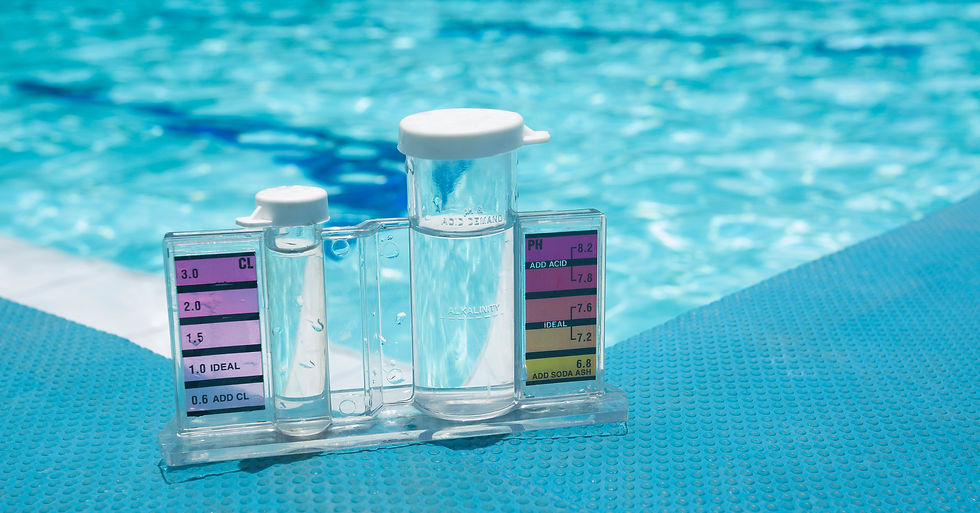Chlorine in Pools: The Good, the Bad, and Making the Right Choice
- Aquanat

- Aug 24, 2023
- 3 min read
Updated: Apr 4, 2024
Expert Swimming Lessons in Perth: The Role of Chlorine and Pool Hygiene
When it comes to choosing the right swim school for your baby or child's aquatic education, an array of factors comes into play. From teaching methods to facility amenities, each aspect contributes to the overall experience. One important aspect is understanding the role of chlorine in pool hygiene and its significance in providing a safe and enjoyable learning environment.
In this article, we'll delve into the pros and cons of chlorine and other sanitation methods, helping you make an educated choice for your family's swimming experience.
The Importance of Pool Hygiene
When selecting a swimming school in Perth for your child, prioritising pool hygiene is paramount. Effective pool sanitation is crucial to prevent infections and maintain a safe environment for young learners. Public and commercial pools in Perth adhere to rigorous health regulations, with chlorine being a key player in pool hygiene due to its effectiveness.

Chlorine: The Science Behind Effective Pool Sanitation
Chlorine is the most commonly used agent for pool sanitation. Despite its reputation for the distinct smell and eye irritation, chlorine itself is odourless when properly diluted in water. Its role in pool hygiene involves dissociating into hypochlorous acid, which eliminates bacteria and other harmful elements by oxidizing nitrogen compounds. The "chlorine smell" is actually a result of chloramines, by-products that are formed when chlorine reacts with microorganisms such as bodily fluids, shampoos, lotions, and more. Excessive chloramines lead to unpleasant odours and discomfort.

Striking a Delicate Balance with Chlorine Use
Pool maintenance is intricate due to numerous variables, including filtration systems, pool location, debris accumulation, and user volume. While alternative methods like salt treatments and ozone generators are available, they have their own set of pros and cons. Salt treatments might seem environmentally friendly, but they ultimately produce the same hypochlorous acid as chlorine. Ozone generators can be helpful in sanitising water flowing out through the filters, but they are not sufficient as standalone sanitation methods as Ozone evaporates very quickly leaving no residual protection for those swimming in the pool.
Achieving optimal pool sanitation requires ongoing professional care and maintaining a delicate balance between effective disinfection and minimising chloramine formation. Several key factors contribute to this balance, including maintaining proper pH levels, controlling total alkalinity, ensuring efficient filtration, and providing adequate ventilation.
When chemical balance is mismanaged the disinfection system isn’t proficient enough to maintain healthy water.

Selecting a Safe and Healthy Pool for Swimming Lessons in Perth
When evaluating a pool's safety and hygiene for swimming lessons in Perth, consider the following:
Ventilation: Proper ventilation ensures a comfortable swimming environment and minimizes the accumulation of chloramine gases.
Water Clarity: Clear water indicates effective filtration and proper chemical balance.
Smell and Irritation: Strong chlorine odours and eye discomfort suggest the presence of chloramines.
Filtration and Maintenance: Regular maintenance guarantees debris removal and optimal sanitation.
Usage Volume: High usage demands meticulous maintenance to manage contaminants effectively
It’s often insufficient or imbalanced sanitation that causes skin irritations, or an underlying condition that gets poked at.

And another tip for parents with young children and infants...
Before submerging your baby and before allowing your toddler to jump into the pool, be vigilant about the water quality!
Smell the water, taste it, and test your own eyes under the water to see how it feels.
If the smell is very strong, if the taste is unpleasant, if the water look murky, and if you feel strong itchiness or a burning sensation on your eyes, it is probably a good idea to walk away and avoid taking the chance of your family's health being compromised.
See more tips for parents for swimming with your child here...
Experience Aquanat's Difference: Your Choice for Swimming Lessons in Perth
At Aquanat Pool in Alfred Cove, we prioritise your safety, comfort, and effective learning:
Limited Capacity: Our small swim groups ensure a low number of swimmers at a time and guarantees a controlled learning environment.
Innovative Design: Natural ventilation ensures a refreshing and hygienic atmosphere.
Optimal Water Quality: Our pool features clear, pleasant water with silky smooth texture, gentle on the eyes and skin.
Dedicated Maintenance: Our commitment to cleanliness and chemistry regulation ensures a safe learning space.

Experience Aquanat's Expert Swimming Lessons in Perth!
In conclusion, chlorine remains a valuable tool in maintaining pool hygiene, provided it's used correctly. By understanding the science behind chlorine's role in pool sanitation and selecting the right swim school in Perth, you're ensuring a safe and enjoyable experience for your child's swimming journey. Explore Aquanat's commitment to safety and quality, and embark on a rewarding aquatic journey with us.
Explore Aquanat's comprehensive aquatic programs, including Baby / Toddler and Parents Swimming Classes, Kids Swim Lessons, Adult and Private Swimming Lessons, and Aquatic Therapy!
Connect with us today to learn more:
Call or text us: 0439 925 952 📞
Email us: info@aquanat.com.au ✉️





